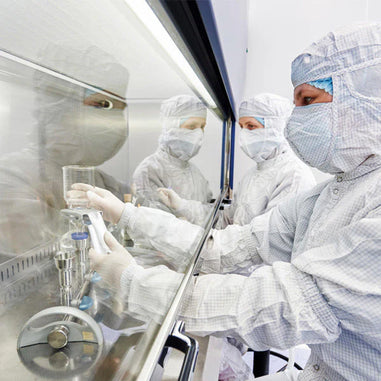- No products in the cart.
Laboratories are the backbone of scientific research and innovation, requiring a seamless supply chain to ensure operations run efficiently. One of the game-changing innovations in this realm is the introduction of smart vending machine solutions for the dispensing of essential lab supplies and personal protective equipment (PPE). In this blog post, we will delve into the significance of these intelligent vending solutions and how they are transforming lab operations.
Smart vending machines are revolutionizing lab operations by providing a convenient and efficient way to manage PPE and lab supplies. These machines offer a number of advantages over traditional procurement methods, including:
- 24/7 access: Smart vending machines can be accessed 24/7, providing researchers with the supplies they need whenever they need them. This is especially beneficial for labs that operate outside of regular business hours.
- Real-time inventory tracking: Smart vending machines track inventory levels in real time, ensuring that researchers always have the supplies they need on hand. This can help to reduce stockouts and improve lab efficiency.
- Data analytics: Smart vending machines can collect data on usage patterns and preferences, which can be used to optimize inventory levels and make better purchasing decisions.
- Reduced costs: Smart vending machines can help to reduce labor costs by automating the inventory management process. They can also help to reduce waste by ensuring that supplies are used before they expire.
How Smart Vending Machines Work
Smart vending machines are equipped with a variety of sensors and technologies that allow them to track inventory, dispense supplies, and collect data. When a researcher selects an item from the vending machine, the machine uses a barcode scanner or RFID reader to identify the item and deduct it from the inventory. The machine then dispenses the item to the researcher.
Smart vending machines are also connected to the cloud, which allows them to transmit data on inventory levels, usage patterns, and other metrics to a central server. This data can be accessed by lab managers and other authorized personnel to optimize inventory levels and make better purchasing decisions.
Benefits of Smart Vending Machines for Lab Operations
Smart vending machines offer a number of benefits for lab operations, including:
- Improved efficiency: Smart vending machines can help to improve lab efficiency by automating the inventory management process. This can free up researchers to focus on their core research activities.
- Reduced costs: Smart vending machines can help to reduce labor costs by automating the inventory management process. They can also help to reduce waste by ensuring that supplies are used before they expire.
- Improved compliance: Smart vending machines can help to improve compliance with safety and regulatory requirements. For example, they can be used to track the usage of controlled substances and ensure that researchers are wearing the proper PPE.
- Enhanced security: Smart vending machines can be equipped with a variety of security features, such as access control and video surveillance. This can help to protect valuable inventory and deter theft.
Case Studies of Smart Vending Machines in Lab Operations
A number of laboratories around the world are already using smart vending machines to improve their operations. Here are a few examples:
- The University of California, Berkeley: The University of California, Berkeley is using smart vending machines to dispense PPE and lab supplies to researchers. The vending machines are equipped with barcode scanners and RFID readers to track inventory and dispense supplies. They are also connected to the cloud, which allows lab managers to track usage patterns and optimize inventory levels.
- The Mayo Clinic: The Mayo Clinic is using smart vending machines to dispense controlled substances to researchers. The vending machines are equipped with access control features to ensure that only authorized personnel can access the controlled substances. The vending machines are also connected to the cloud, which allows the Mayo Clinic to track the usage of controlled substances and ensure compliance with regulations.
- GlaxoSmithKline: GlaxoSmithKline is using smart vending machines to dispense lab supplies to researchers. The vending machines are equipped with barcode scanners and RFID readers to track inventory and dispense supplies. They are also connected to the cloud, which allows GlaxoSmithKline to track usage patterns and optimize inventory levels.
Lab Pro Inc: Transforming Laboratories with Smart Vending Solutions
Lab Pro Inc. is at the forefront of innovation, not only revolutionizing lab operations through the introduction of smart vending machine solutions but also extending their expertise to cater specifically to the needs of researchers and professionals. With Lab Pro Inc.'s cutting-edge lab vending machines, researchers gain access to a comprehensive array of supplies, including precision tools from Excelta, essential PPE, and a diverse range of lab supplies. This all-in-one solution streamlines the procurement process, offering unparalleled convenience and efficiency.
The Future of Smart Vending Machines in Lab Operations
Smart vending machines are still a relatively new technology, but they have the potential to revolutionize lab operations. As the technology continues to develop and become more widely adopted, we can expect to see smart vending machines play an even greater role in helping laboratories to improve efficiency, reduce costs, and enhance compliance and security.
Here are some additional thoughts on the future of smart vending machines in lab operations:
- Integration with other lab systems: Smart vending machines can be integrated with other lab systems, such as laboratory information management systems (LIMS) and inventory management systems. This integration can further streamline lab operations and improve efficiency.
- Use of artificial intelligence (AI): AI can be used to further optimize the use of smart vending machines in lab operations. For example, AI can be used to predict usage patterns and ensure that the right supplies are available in the right quantities at the right time.
- Increased adoption in developing countries: Smart vending machines are becoming increasingly popular in developing countries. This is due to the fact that smart vending machines can help to improve access to essential supplies in remote and underserved areas.
Conclusion
Smart vending machines offer a number of advantages over traditional procurement methods, making them an ideal solution for managing PPE and lab supplies in laboratories. Smart vending machines can help to improve efficiency, reduce costs, improve compliance, and enhance security.












































